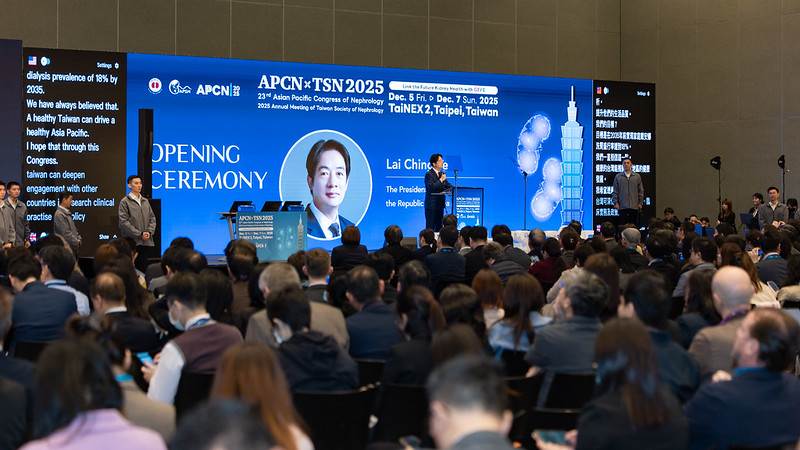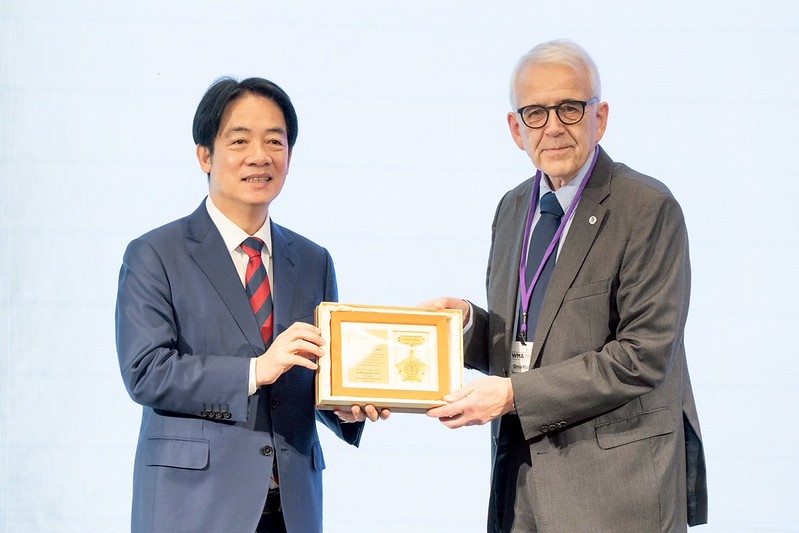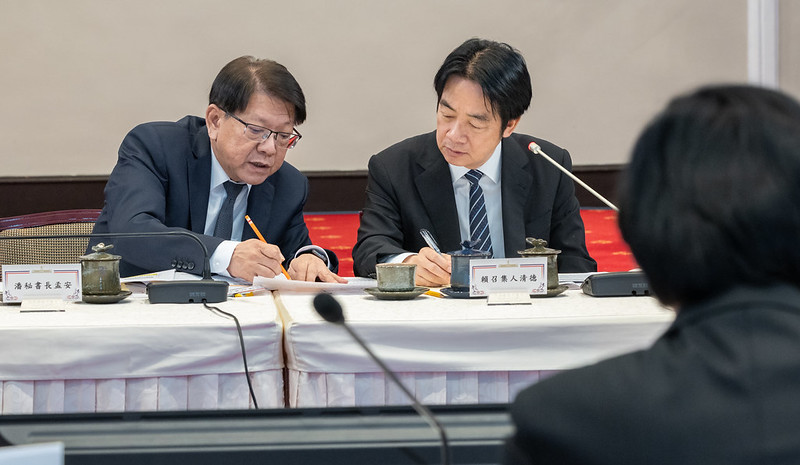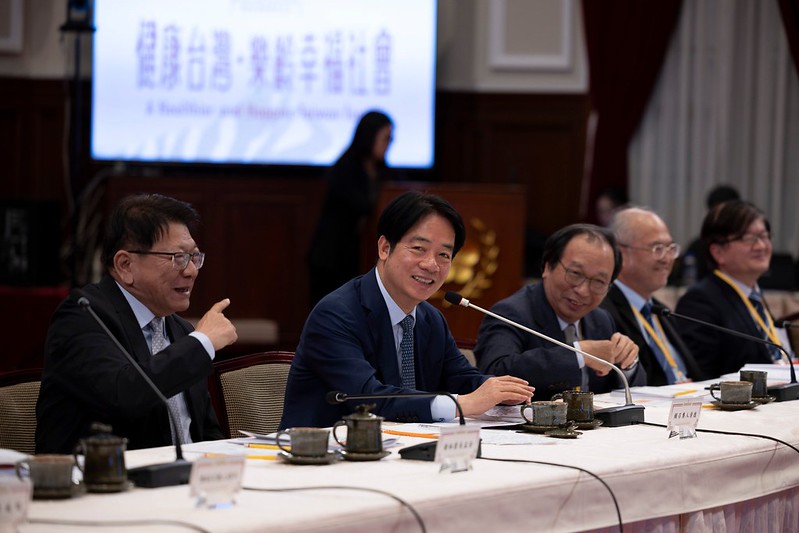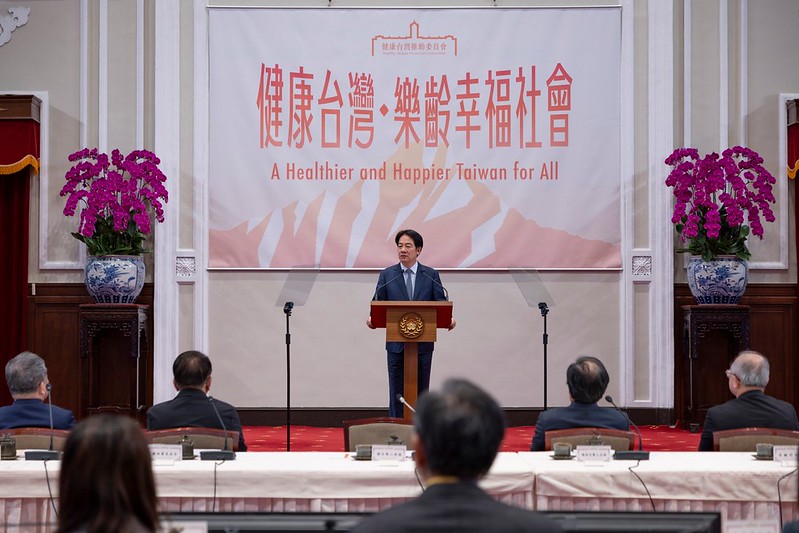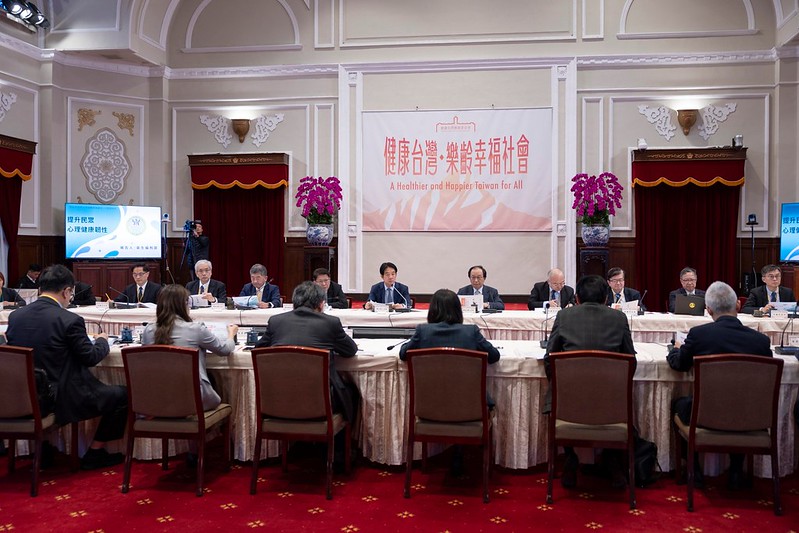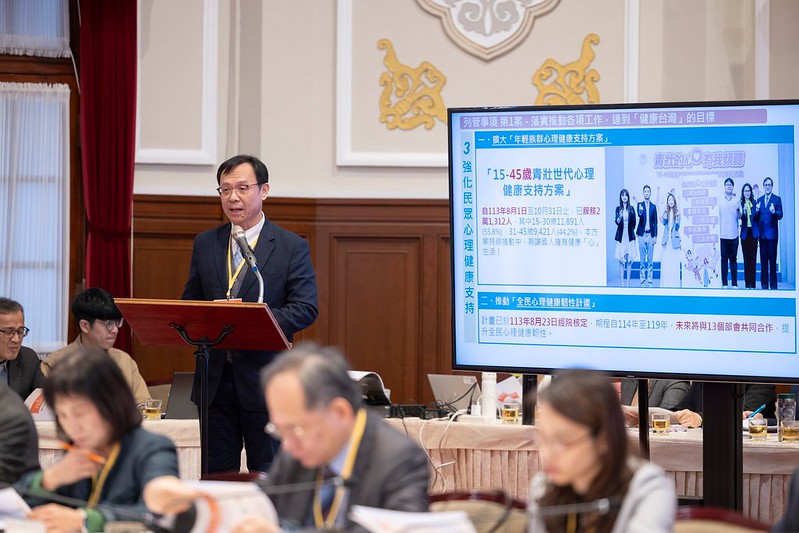News & activities
 News releases
News releases
On the afternoon of November 28, President Lai Ching-te presided over the second meeting of the Healthy Taiwan Promotion Committee. In his opening statement, the president said that we are implementing mental health support programs this year to provide more support for young and middle-aged people, pointing out that the policy has served over 20,000 people since it was implemented just over three months ago. In terms of bolstering mental health resilience, the president said we still have much to do, our government must lead by example, and the public and private sectors must work together, making every effort to ensure that no one is left behind.
Noting that our goal is to reduce the standardized cancer mortality rate by one-third by the year 2030, President Lai stated that next year’s budget for cancer screening will be increased to NT$6.8 billion. He also stated that plans are in the works to establish a fund for new cancer drugs, adding that in the general budget we will allocate NT$5 billion, which will gradually rise to NT$10 billion. At the same time, he said, we are also actively promoting genetic testing and precision medicine. He expressed confidence that expanding preventive screening at the front end and providing advanced treatments at the back end will effectively fight cancer and improve the overall health of our citizens.
A translation of President Lai’s opening statement follows:
Today is the second meeting of the Healthy Taiwan Promotion Committee. First, I want to thank our two deputy conveners, our advisors and committee members, and our friends online for their enthusiastic participation. I also want to welcome Committee Member Chien Wen-jen (簡文仁), who was on leave for the previous meeting.
I would also like to introduce three new committee members: Let’s welcome Committee Member Huang Chin-shun (黃金舜), president of the Federation of Taiwan Pharmacists Associations. During the pandemic, he led the nation’s pharmacists in promoting services including name-based distribution systems for masks and rapid-test kits and home delivery of medications. I am sure that he will be able to provide many valuable views regarding pharmaceutical safety and supply resilience.
Let’s also welcome Committee Member Ko Fu-yang (柯富揚). During his time as secretary-general of the National Union of Chinese Medical Doctors’ Association, he led the Chinese medicine community in the transition from experience-based medicine to evidence-based medicine, and promoted the modernization of traditional Chinese medicine. With his participation, the committee will be able to spur research and development in both modern and traditional medicine.
Our third new committee member is Liao Mei-nan (廖美南), president of the Taiwan Nurses Association, who was unable to be here today. She has long been dedicated to raising the quality of nursing care and actively promoting a high-quality, friendly work environment for nurses. The committee will rely on her experience to strengthen the link between policy and practice in nursing care.
I want to thank all the members of the committee once again for working together with the government. Since the last committee meeting, under the guidance of Minister without Portfolio Chen Shih-chung (陳時中), the Ministry of Health and Welfare (MOHW) has implemented various policies. At the beginning of October, for example, three major AI centers were set up to resolve three key AI application issues: implementation, certification, and reimbursement, helping advance Taiwan’s smart healthcare ecosystem.
At today’s meeting, the MOHW will first deliver a report on the progress of certain items listed in the first committee meeting, followed by a joint report by the MOHW and Ministry of Education on bolstering public mental health resilience and a report by the MOHW on enhancing cancer prevention and treatment strategies.
The World Health Organization has affirmed that “there is no health without mental health.” In a fast-changing, fast-paced society, the government should invest more resources in the field of mental health to safeguard the people’s overall health.
We are therefore implementing mental health support programs this year and expanding the range of eligibility, from 15 to 30, to 15 to 45 years old, to provide more support for young and middle-aged people. That policy has served over 20,000 people since it was implemented just over three months ago.
In terms of bolstering mental health resilience, we still have much to do. From the workplace to the campus and every corner of society, our government must lead by example, and the public and private sectors must work together, making every effort to ensure that no one is left behind.
Aside from mental health, in view of cancer being the leading cause of death in Taiwan for 42 consecutive years, our goal is to reduce the standardized cancer mortality rate by one-third by the year 2030.
And so we must expand screening and advance treatment. Last year, the government subsidized screenings for five types of cancer, providing a total of 4.87 million screenings and detecting 11,000 cases of cancer and 52,000 cases of precancerous conditions. We have allocated an additional NT$4 billion beginning next year, bringing the total budget for cancer screening to NT$6.8 billion, to expand the scope of cancer screening eligibility and services.
Plans are also in the works to establish a fund for new cancer drugs. In next year’s general budget, we will allocate NT$5 billion, which will gradually rise to NT$10 billion, to provide reimbursement funding for a variety of new cancer drugs and reduce the economic burden on patients. These new measures will be reported on in detail moments from now by the MOHW. At the same time, we are also actively promoting genetic testing and precision medicine. Next generation sequencing, for example, has already been included in National Health Insurance coverage, which will help provide patients with precise, individualized treatment strategies.
I am confident that expanding preventive screening at the front end and providing advanced treatments at the back end will effectively fight cancer and improve the overall health of our citizens. Today’s meeting will help the government understand viewpoints from many perspectives so we can promote policies that more closely meet the public’s needs. Let’s keep working hard together. Thank you.
Following his statement, President Lai heard a report on the progress of certain items listed in the first committee meeting from deputy executive secretary and National Health Insurance Administration Director General Shih Chung-liang (石崇良), a joint report on bolstering public mental health resilience from Deputy Minister of Health and Welfare Lin Ching-yi (林靜儀) and Deputy Minister of Education Lin Teng-chiao (林騰蛟), and a report on enhancing cancer prevention and treatment strategies from Deputy Minister of Health and Welfare Chou Jih-haw (周志浩). Afterward, President Lai exchanged views with the committee members regarding the content of the reports.
